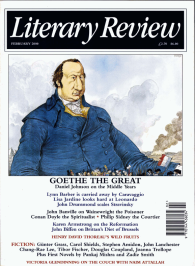Blake Morrison
Has Been Greener
My Century
By Günter Grass
Faber & Faber 280pp £16.99
Most years, the announcement of the winner of the Nobel Prize for Literature is greeted with surprise. Wislawa who? A Japanese novelist called what? The only surprise about the 1999 award was that Gunter Grass hadn’t won it already. Some imagined he had – perhaps thinking of his compatriot Heinrich Böll (1972) or his magical-realist confrere Gabriel Garcia Marquez (1982). Certainly, between The Tin Drum (1959) and The Flounder (1977), Grass did more than enough to merit the prize. The mills of the Swedish Academy grind slowly. Still, in the end, at seventy-two, Grass was ‘enNobeled’. And rightly so.
It is a pity his new book doesn’t show him at his best. The idea for it was a good one: a story for every year of the last century, each narrated in a different voice. War, politics, dictatorship, dissidence, migration – Grass has always been drawn to big subjects,

Sign Up to our newsletter
Receive free articles, highlights from the archive, news, details of prizes, and much more.@Lit_Review
Follow Literary Review on Twitter
Twitter Feed
It wasn’t until 1825 that Pepys’s diary became available for the first time. How it was eventually decrypted and published is a story of subterfuge and duplicity.
Kate Loveman tells the tale.
Kate Loveman - Publishing Pepys
Kate Loveman: Publishing Pepys
literaryreview.co.uk
Arthur Christopher Benson was a pillar of the Edwardian establishment. He was supremely well connected. As his newly published diaries reveal, he was also riotously indiscreet.
Piers Brendon compares Benson’s journals to others from the 20th century.
Piers Brendon - Land of Dopes & Tories
Piers Brendon: Land of Dopes & Tories - The Benson Diaries: Selections from the Diary of Arthur Christopher Benson by Eamon Duffy & Ronald Hyam (edd)
literaryreview.co.uk
Of the siblings Gwen and Augustus John, it is Augustus who has commanded most attention from collectors and connoisseurs.
Was he really the finer artist, asks Tanya Harrod, or is it time Gwen emerged from her brother’s shadow?
Tanya Harrod - Cut from the Same Canvas
Tanya Harrod: Cut from the Same Canvas - Artists, Siblings, Visionaries: The Lives and Loves of Gwen and Augustus John by Judith Mackrell
literaryreview.co.uk